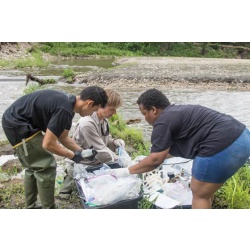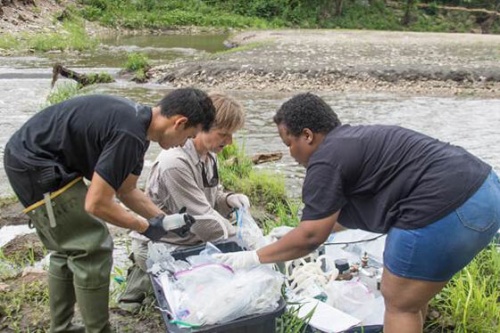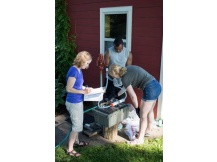
New water quality research project is underway in Winneshiek County
A new water quality research project investigating water-borne disease-causing agents in Winneshiek County is underway. Luther College biology professors Eric Baack and Jodi Enos-Berlage have been awarded a $39,938 grant from the Iowa Center for Health Effects of Environmental Contaminants that will allow them to quantify levels of harmful bacteria and viruses in both ground and surface waters. Luther is the first small college to receive this grant in CHEEC's 30-year history.
Baack, Enos-Berlage and a team of eight undergraduate students this summer traveled Winneshiek County to sample water from streams, springs and private wells. The sampling included wells from all corners of the county, as well as Dunning's Spring, Twin Springs and Siewers Springs; the Upper Iowa River; and Trout Run Creek, Dry Run Creek and Ten Mile Creek.
The team uses ultrafilters to filter 200 gallons of water from private well sources and 50 gallons from streams and springs (which are likely to have higher levels of microbes) in order to trap viruses and bacteria that are present. The team then sends the samples overnight on ice to the USDA lab in Marshfield, Wisconsin.
The research project could reveal information about the source of any water contaminant. Microbial markers specific to humans, cows and pigs are included, providing clues as to whether contaminants are coming from leaking human septic systems or run-off of livestock manure, for example. If pathogens are present in the absence of these markers, this result would suggest a different source, such as wildlife. A preliminary study in the summer of 2017 found that Dunning's Spring had bacteria from both humans and cows present after a heavy summer rain.
For the present study, the team surveyed in locations and under conditions that would be at high risk for contamination. The wet spring and early summer in 2018 was ideal for this work, as heavy rains promote water (and contaminant) movement in both surface and groundwater. If the results of this initial study in Winneshiek County show significant risk of water-borne diseases under these select conditions, Baack and Enos-Berlage plan to apply for further grant funding to study a wider set of wells over a longer time period and more diverse set of conditions.
Once the team has the results, they hope to present them locally.
Site designed and maintained by Iroc Web Design Services©.
Your Small Business Web Design Solutions.™



